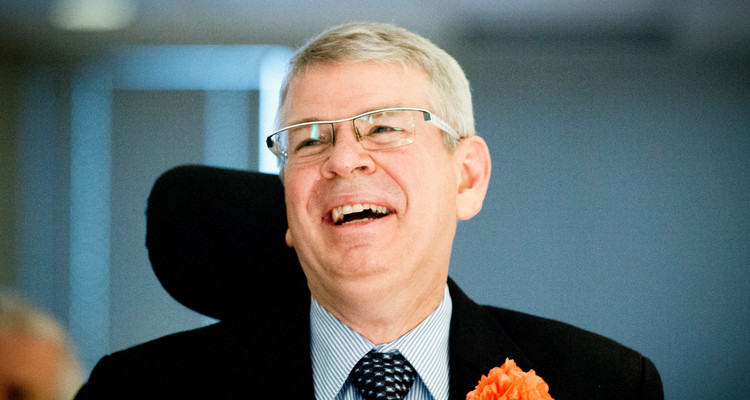If You Embrace It, It Will Teach You
Excerpts from Bruce Kramer's conversation with Krista Tippett, "Forgiving the Body: Life with ALS," On Being, March 26, 2105:
We Wouldn't Go Back
What I found, as I told people about ALS, was they began to tell me about ALS.
They began to tell me about the ALS they carried. They began to tell me about the struggles that they were working through, too. And I think that they told me not because it was a way of cleansing or a way of — but it was a way of saying we carry these things. And I want you to know I'm carrying something, just like you are. And what I began to realize is that these things that we carry, these struggles, emotional — physical, spiritual — that these struggles, they weren't transparent. But that ALS revealed them.
In those moments together, if I could teach myself to be quiet, to listen, what I found was that these struggles were informative. They actually helped define the pathways that each of us were taking. And we had absolutely no expectation that these things were going to be cured. A person whose marriage was blowing up, a friend — they didn't expect that their marriage would suddenly come back together. They realized that this experience was going to be with them for the rest of their lives, no matter what.
I knew that I would not be cured of ALS, although, there are a lot of people out there who will tell you they can do it. But I knew I wasn't going to be cured. It would be with me for as long as I lived, as long as this body continued to live.
It became almost an acknowledgement that in the room, in this room right now, as we are sitting here, each one of us holds almost a personage, sitting next to us, abiding in the gut, living in our breath. And that personage defines who we are in so many ways. And what I kept hearing was that you can't run away from this. If you embrace it, it will teach you. It will open you. And dis ease became my name for that, for that phenomenon.
And then there's disease. And I think I write someplace, disease is a lie. The medical model is a lie. We will never be cured. If you have a cavity in your tooth, they'll fill it, but you still have that cavity.
If you have cancer, that cancer may go away for a while, but you will always carry the personage of cancer with you. And so, if you buy into the disease story, you will only be frustrated. You will only be disappointed. And ultimately, I think you will feel ill-used by life itself.
But if you understand that there is this phenomenon where cancer, where relationships that go awry, where ALS, where all of these things become a way to see the world, open up the world to you, then you are given a great gift.
And so when Ev tells you she wouldn't go back. When I tell you I wouldn't go back, it's because we actually passed through the fire and the ice of disease and embraced the fact that this is the greatest teacher we will ever know.
Embrace Vulernability
Healing comes in many guises. We're healed by just the touch of a friend. We're healed by the hug of a child. And healing does not imply that your life is suddenly going to lose all of the struggle, all of the challenge. What it does instead is it strengthens us for what is next. But to be open to healing means to be vulnerable.
I think if you look at me, you know I'm what they would call a vulnerable adult. The cat doesn't even listen to me here. I have no real sense of control anymore.
And so, again, the choice could be to resent this. To be frustrated by it. And there are times when I am. I promise. But I think the greater choice is the fact that once you embrace your vulnerability, you are open to such beauty. And in the end, isn’t this one of the things that truly makes us human? The ability to make, to perceive, to live in beauty.
What Really Matters
Sadness is a way of sensitizing you to what really matters, what's really meaningful. And death does that. I see my death. It looms in front of me sooner than I would like, but because it's there, because we live with that, I am so grateful for just this moment, for this time together. And that is a great gift. And by embracing that. I realize there's nothing to be afraid of.
From A Prayer for the Living by Jeff Foster

